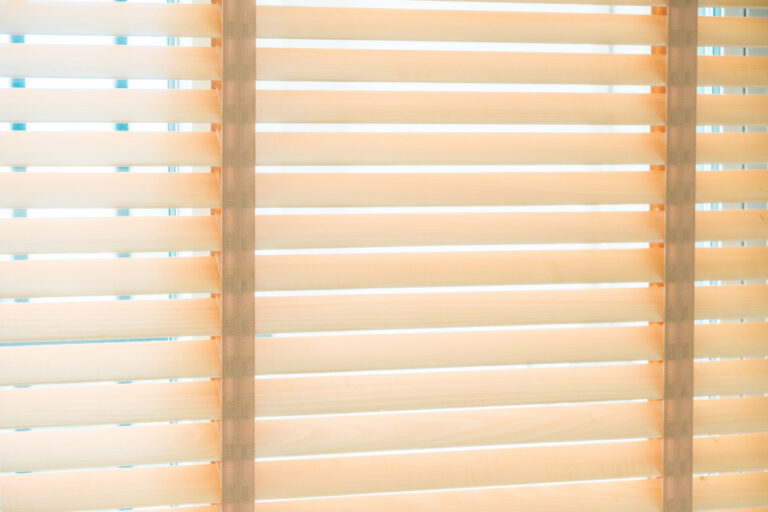
Shades are window coverings made of fabric, while blinds are typically made of hard materials like wood or metal. Both shades and blinds serve the same purpose of providing privacy and controlling light levels in a room. However, people often struggle to choose between the two options. This post shares a detailed insight on shades and blinds to help you narrow your selection and finally pick the right window treatment for your place.
Most shoppers might use the words 'shades' and 'blinds' interchangeably. However, there are two different types of window treatments. Here are some fundamental differences to clarify:

You should consider opting for shades as your window treatment for several reasons.
The main advantage of window shades is their ability to control light levels in a room. Choosing sheer fabrics allows natural light to filter through, while thicker materials offer complete darkness when closed.
Window shades made of insulating materials like cellular or woven wood can help reduce energy bills by keeping the heat out during summers and retaining warmth during winters.
Shades provide complete privacy when closed, making them ideal for bedrooms and bathrooms.
While shades have numerous benefits, they come with some drawbacks.
Compared to blinds, shades offer a limited range of styles and designs. This can restrict your options if you want a specific look or aesthetic.
Shades can be challenging to clean due to their fabric materials. Dust, pet fur, and other debris can easily get trapped in the folds of the fabric, making cleaning a time-consuming task.
Blinds have a unique set of advantages that make them popular among homeowners.
Blinds offer greater versatility in light control compared to shades. With tilting and lifting options, you can adjust the amount of natural light entering your room as desired.
Blinds come in various styles, materials, & colors, providing more customization options. This makes them suitable for any room in your house, from traditional to modern decor.
Blinds require minimal maintenance & are easy to clean compared to shades. A simple wipe with a damp cloth is all needed to keep them dust-free and looking new.
Before making a final decision, consider these downsides of blinds, too.
Some types of blinds, such as Venetian blinds, have cords that can get tangled easily. This could be a safety hazard, especially if you have small children or pets.
Blinds offer less insulation than shades since they are made of hard materials. However, choosing thicker materials like wood can provide some level of energy efficiency.
When deciding between shades and blinds, there are various factors that you should keep in mind. Some of the crucial ones include:
The type of window treatment you choose will depend on the purpose & functionality of the room. For instance, shades are a better option if you need complete darkness in your bedroom for better sleep. However, blinds would be the perfect fit for a living room where natural light is desirable.
The window treatment you choose should complement the overall interior design of your space. Shades lend a softer and more elegant look, while blinds have a sleek and modern appeal. Consider your room's style and color scheme to make the right choice.
Shades and blinds vary in cost depending on the material, style, and size. Blinds are generally more affordable than shades due to their simple design, but custom options can be pricier. It's essential to set a budget before making your decision.
Both shades and blinds require maintenance to keep them clean and functioning correctly. Some materials may be easier to clean & maintain than others, so consider your cleaning preference before choosing.
Shades and blinds have different installation methods, so it's vital to check the options available for your windows. Some shades require professional installation, while some blinds can be easily installed by DIY enthusiasts.
Both shades and blinds can last for several years if maintained properly. However, blinds made of durable materials like wood or aluminum typically have a longer lifespan than fabric shades.
If energy efficiency is a concern, consider the insulation properties of shades and blinds. Shades, due to their fabric material, tend to provide better insulation, while blinds made of hard materials offer minimal insulation.
If you have children or pets at home, it's important to consider the potential hazards of window treatments with cords. If safety is a concern, opt for cordless options like cordless shades or blinds with motorized controls.
You can choose from various blinds based on your specific needs and preferences. Here are some popular options:
Shades also come in various types, each with unique features and benefits. Consider these options:

The best window covering for each room depends on several factors, including the room's purpose, size and shape of windows, and personal preferences. Here are some suggestions:
For bedrooms, privacy and light control are key considerations. Shades can provide complete darkness when closed, making them an ideal choice. Cellular shades also offer energy efficiency, keeping your room cool in the summer & warm in the winter.
Blinds are a popular choice for living rooms due to their versatility in light control. You can adjust them to allow natural light while still maintaining privacy. Roman shades are also stylish, adding an elegant touch to your living room.
In the kitchen, where moisture and heat are common, choosing a window treatment that is easy to clean and maintain is best. Blinds are a practical option as they can easily be wiped down, while solar shades can help block out harsh sunlight and protect your furniture from fading.
For bathrooms, choosing a window covering that offers privacy while still allowing natural light in is essential. Roller shades made of moisture-resistant materials are a perfect choice. You can also opt for top-down/bottom-up shades that give you control over privacy and light.
Blinds offer more versatility in light control and are easier to maintain, while shades provide better insulation and may be a safer option for homes with children or pets. Thus, the better option depends on your specific needs and preferences. So, consider factors such as function, aesthetics, budget, and insulation before deciding.
Shades are generally more affordable than blinds due to their simpler design and construction. However, the cost can vary depending on factors such as material, style, and size. Setting a budget & comparing prices is important to make an informed decision.
Blinds and shades are popular window treatment options that can add style & functionality to your space. They complement a room's aesthetics in different ways. Blinds have a modern and sleek appeal, while shades have a softer and more elegant look.
Roller shades are made of a single piece of fabric that can be rolled up or down using a cord or motorized controls. Traditional blinds, on the other hand, consist of horizontal slats that can be adjusted to control light and privacy. While both offer similar light control and privacy benefits, roller shades are simpler and may be easier to maintain.
Before finalizing a decision, consider the following factors: functionality, durability, style, cost, and safety. Next, select the window treatment style that suits your space. DP Interiors experts can help you choose the right treatment for your windows. And voila—you have it—a perfect window for your home!
Whatever decision you make, remember to choose a style that reflects your taste & complements the overall look of your space. Check out amazing blinds and shapes at DP Interiors. Contact us for a consultation. We'll help you find the perfect window treatment for your home.
Read our other blogs for more pros and cons of selecting window shades.